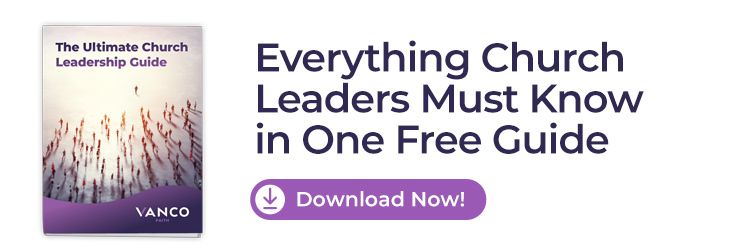
Lead pastor isn’t just a title — it’s a calling that blends spiritual leadership organizational strategy and community impact. Whether you’re preaching life-changing sermons, guiding church members through challenging circumstances or navigating tough decisions with church boards, the role is dynamic and deeply influential.
Unlike associate or youth pastors, lead pastors are responsible for casting vision and driving church growth. But what does it take to thrive in this role? From mastering biblical teaching to leveraging tools like online giving platforms, this guide breaks down the essential responsibilities, key qualities and career path insights to help you succeed as a lead pastor.
Table of Contents
- What are the primary responsibilities of a lead pastor?
- How does a lead pastor differ from other types of pastors?
- What skills and qualities are essential for becoming a lead pastor?
- What is the typical career path to becoming a lead pastor?
- How do lead pastors balance administrative duties with spiritual responsibilities?
- What challenges do lead pastors face in their role?
- How is a lead pastor held accountable for their role?
- What are the key metrics for success as a lead pastor?
- How can aspiring lead pastors prepare for this vital role?
- Free church leadership guide
Too Busy to Read? Listen to the Key Takeaways
Get the key takeaways by clicking to listen the podcast summary now!
What are the primary responsibilities of a lead pastor?

Providing spiritual leadership and vision
A lead pastor should be the church's primary spiritual leader and visionary. Being a visionary is more than big thinking; it's about shaping the church's vision, which fits into biblical principles and the congregation's needs. A big-picture vision fosters strong spiritual growth for the community as well.
Spiritual leadership is about seeking God's guidance earnestly in prayer, declaring the vision with clarity and leading by example in faith, integrity and service. The lead pastor is the main unifier of the church around common goals and principles, ensuring the entire ministry is heading toward a common mission. Think of it as what it means to be a shepherd, encouraging others to come a little closer to Christ and empowering and instructing them to be able to do so.
Preaching and teaching the gospel
Preaching and teaching the gospel are the focal points of a lead pastor's ministry. Great preaching is inspirational and challenging and equips people to grow in their faith. Teaching usually occurs beyond the pulpit through Bible studies, discipleship groups or mentoring others in their spiritual path. A lead pastor must, therefore, know scripture well and communicate it clearly and authentically to meet the community's needs.
Overseeing church staff and ministries
As lead pastor, you're not only tasked with spiritual leadership, but also play the role of the church manager, handling operations and running the day-to-day business. You guide and direct employees in professional development. You ensure the effectiveness of the ministry in carrying out the church's mission.
Clear communication and regularly scheduled team meetings are essential in keeping the team united and on task. Whether for organizing a church outreach event or resolving issues in the children's ministry, a lead pastor ensures everything runs smoothly in the church to serve its people well.
Engaging in community outreach and local ministry programs
Community outreach is just one of the fundamental roles assigned to the lead pastor within the church. It arms the church with a bridge to the world beyond its walls. Outreach involves meeting the needs of the community through food drives, mentorship programs or local organization partners.
The church demonstrates that the faith community is living the gospel in action with caring, consistent outreach. As a pastor, you lead from the front and inspire others to jump on board. It's an excellent opportunity to establish significant relationships that demonstrate Christian love and care to those who might never see the inside of the church on Sunday. That's where ministry flourishes as you work hand-in-hand with your church’s ministry leaders.
How does a lead pastor differ from other types of pastors?
Comparing lead pastors to associate and assistant pastors
The lead pastor is the ultimate spiritual leader who casts a vision for the church and directs how it should go. On the other hand, an associate pastor carries out the same vision but focuses on a particular area of ministry, like discipleship, outreach or simply programming.
An assistant pastor is usually heavily involved in the everyday running of the church – like pastoral care or small group leadership. While all weighty strategic planning and church governance is on the shoulders of lead pastors, associate pastors and assistant pastors take on the work of collaborative implementation into the church's mission.
Understanding the Role of executive pastors
Another pastor who oversees the administrative and operational aspects of the church is the executive pastor. While the lead pastor provides spiritual direction and vision, the executive pastor takes steps to implement it practically. An executive pastor's responsibilities include church administration, budget coordination and logistics for various ministries.
Look at an executive pastor as the person who facilitates efficient running things behind the scenes so the lead pastor can focus on preaching and shepherding the faith community. While both roles entail strong leadership, the executive pastor runs to strategy and organization, making them indispensable partners in mission and ministry success.
Distinguishing between lead pastors and youth pastors
The youth pastor concentrates on young people by counseling, hosting events and addressing their spiritual needs, while the lead pastor oversees the entire flock, which means all age groups, ministries and all things to do with church growth. The youth pastor focuses on a specific demographic.
In contrast, the lead pastor brings together a vision for the church that would unite every ministry under one mission objective. Both parts are key, but the lead pastor has to be bigger-picture thinking by ensuring that the work of the youth pastor and other leaders synchronize with the goals of the overall church.
What skills and qualities are essential for becoming a lead pastor?
Developing strong leadership and organizational abilities
Leadership is multifaceted and pastors who occupy this role must have strong leadership and ministry skills, using their spiritual vision to ground practical organization. The lead pastor must communicate goals clearly and concisely, administer resources wisely and supervise diversified staff and volunteer teams.
Strong leadership isn’t about making every decision, but empowering people to perform better in their designated roles. Leadership is equally concerned with organizational skills. Whether coordinating a significant event or trying to navigate tedious tasks daily, the lead pastor brings the ability to lead with clarity and integrity.
Cultivating spiritual gifts and biblical knowledge
A deep connection with God combined with a sound understanding of biblical teachings are must-haves for a lead pastor. Your capability to develop spiritual direction through prayer, study and reflection is instrumental in defining how effectively you will lead others.
More than personal devotion, a lead pastor should be able to understand theological concepts and convey them meaningfully to his faith community. Cultivation of spiritual gifts—whether that gift is teaching, discernment or encouragement—becomes the key to creating meaningful connections with the congregation.
When all of these qualities are lived out with genuineness, they, in turn, serve as the building blocks of trust in others who will look up to a lead pastor in deepening their faith journeys.
Mastering effective communication and preaching skills
Preaching entails more than just giving a well-prepared speech. It’s about touching the hearts and minds of the people you speak to. The lead pastor must communicate clearly in one-on-one conversations, sermons and discipleship programs.
Effective preaching involves telling stories and precise messages with an excellent understanding of scripture and lots of empathy for the challenges your congregation faces.
Outside of the pulpit, communication skills help facilitate collaborative work among staff and volunteers so that every aspect aligns smartly with the church's vision.
Building skills in conflict resolution and mediation
In every faith community, conflict is inevitable; however, the manner of handling it can define and shape the church's culture. That's why every lead pastor needs to have mediation and conflict resolution skills to negotiate disagreements in any congregation, among staff or even among board members.
Listening is also essential — taking the time to hear all sides assists in building trust while creating solutions built on mutual respect.
Patience must also be exemplified when mediating a conflict. Additionally, you must show great understanding (emotional intelligence) of everything, particularly regarding "sensitive" issues.
Handling conflict with humility and the desire for reconciliation results in unity that binds all in Jesus Christ.
What is the typical career path to becoming a lead pastor?
Starting as an associate or assistant pastor
Most lead pastors begin their ministerial journey as associate or youth pastors, learning the daily realities of ministry under experienced pastors. Such roles provide even more fantastic hands-on experience in pastoring duties, including spiritual advising, congregational support and overall assistance in operating the church.
These roles help an aspiring lead pastor learn the church's governance style, teaching them practical relationship-building and team collaboration skills. Essentially, this time is a formative process where one can grow under a mentor while significantly contributing to the faith community.
Gaining experience in various areas of ministry
A versatile lead pastor often draws on wisdom over his span in several ministries - from working with a youth pastor to managing a discipleship program or serving as a worship leader. Such wisdom broadens his sense of understanding regarding the working of the different parts of the church together.
It aids in making a pastor more flexible, whether it be managing events, teaching classes or having a hand in church planting efforts. Through varied experience, aspiring lead pastors have a head start assuming responsibility for ministry oversight.
Pursuing education and ordination requirements
Education and ordination are vital steps to becoming a lead pastor. Formal theological training, often through a seminary or Bible college, provides a solid foundation in spiritual guidance and Scriptural knowledge. Ordination, overseen by the church board or a denominational body, affirms a pastor’s calling and qualifications for pastoral responsibilities.
How do lead pastors balance administrative duties with spiritual responsibilities?
Managing day-to-day church operations
Church leadership is far beyond what people see on a Sunday. It's counseling members, leading activities, managing event schedules, making budgets, etc. With those responsibilities, a church leader needs to have a good plan to check or balance everything.
Balancing these administrative tasks while staying focused on the church’s spiritual mission is a delicate but essential part of leadership.
Delegating tasks to church staff and volunteers
No lead pastor can do everything by themselves, so many associated tasks should be delegated to others in the church, whether they be elders, volunteers or staff. This aspect ensures the shared responsibility is well-executed.
It could be overseeing an event, coordinating discipleship programs or asking a few members to be in charge of several particular activities.
In giving others responsibility for specific tasks, a lead pastor has less to worry about or do; the pastor can then have more time to focus on other priorities.
Prioritizing pastoral care and discipleship
Leading a church doesn't solely mean administration. It’s also about pastoral care and faith guidance. Ensuring they leave themselves quality time for prayer, counseling and spiritual discussions is the best way lead pastors can be equipped to care for their congregation.
For this reason, a lead pastor can’t be too absorbed in administrative work and overlook their primary duty. Finding the right balance helps ensure that the church remains a place where people are challenged for growth and life.
Using technology and social media for church engagement
Social media is a powerful way to reach your faith community beyond Sunday mornings. Platforms like Facebook and Instagram allow pastors to share sermons, encourage conversations and foster connections. Vanco’s free social media strategy guide can help you grow your flock online, making engaging members easier and extending your church’s mission into the digital space.
Leveraging online giving platforms
Handling finances can be more straightforward with the right tools. Vanco’s online giving platform allows churches to streamline donations, making giving more manageable for members while reducing administrative burdens. Our tool aligns with modern engagement strategies, letting pastors focus on ministry while ensuring financial stability.
Finding the right online giving provider
Choosing an online giving provider doesn’t have to be complicated. Vanco offers a detailed guide to help churches navigate the process, ensuring you select a platform that suits your needs. This resource can provide clear, actionable steps if you’re just starting fresh or improving an existing system. Check out the guide here.
What challenges do lead pastors face in their role?
Navigating congregational expectations and conflicts
It is often tricky for a lead pastor to manage the varying expectations within the church. These differences can range from one individual not liking how the worship service is conducted to another not agreeing with a priority on missions or another questioning how the church governs itself.
Keeping things together in the face of these differing expectations can sometimes be challenging since they can escalate into problems that must be resolved.
Maintaining work-life balance and avoiding burnout
Balancing pastoral duties with personal life is one of the most complicated challenges. Constant demands for pastoral care, sermon preparation and church administration can leave little room for rest or family time. Without boundaries, the risk of burnout is high. Pastors need to ensure they carve out time in their schedules to be with their family, do hobbies they enjoy and rest when they need it.
Adapting to changing societal and cultural norms
Cultural changes can test the resolve of a lead pastor in guiding his flock within faith while keeping an eye on the scriptures. Topics like inclusivity, changes in the family dynamic and a rapidly growing technological involvement in religious services are all stress points.
Leading the church through crises
Financial, moral or external crises test a pastor’s leadership and faith. Whether dealing with a natural disaster or internal division, a lead pastor must provide spiritual guidance, stability and direction. During these moments, the congregation looks to their leader for clarity, hope and a path through uncertainty.
How is a lead pastor held accountable for their role?
Understanding accountability structures like church boards and elders
Oftentimes, the responsibility comes to the church board or the council of elders, who supervise and guide the lead pastors. The church board and the board of elders are there to ensure that decisions are made per the church mission, while they can also lend powerful support in navigating critical areas of church governance.
Balancing authority with collaboration in decision-making
A lead pastor has a huge role, but one thing that makes the work effective is constantly carrying out responsibilities through collaboration. Whether getting involved in the actual operations of the church or trying to get a church vision off the ground, a lead pastor should include other people in the decision-making process, creating that bond of trust.
What are the key metrics for success as a lead pastor?
Measuring church growth and discipleship engagement
Tracking church growth involves more than attendance numbers. Look at how well discipleship programs shape lives, facilitate spiritual maturity and inspire deeper connections within your faith community.
Evaluating financial health and stewardship
Healthy finances reflect responsible church administration and generosity within the congregation. Regularly review budgets, giving trends and ministry funding. Our free eBook offers tools to master church financial stewardship.
Assessing congregation satisfaction and involvement
Engaged members are a sign of that a leader is carrying out their pastoral responsibilities well. Assess satisfaction by gathering honest feedback, observing ministry participation and noting how actively members serve and support the church mission.
How can aspiring lead pastors prepare for this vital role?
Seeking mentorship from experienced church leaders
Learning from those who’ve walked the road before you is invaluable. Mentors, such as executive pastors or seasoned church elders, can share their experiences, offer guidance on handling challenges and help you grow into a confident leader.
Developing a strong prayer life and personal spiritual discipline
Your relationship with God needs to come first. A deep, consistent prayer life keeps you spiritually grounded and prepared for the responsibilities of leading others. It also strengthens your ability to guide the congregation through life’s ups and downs.
Gaining practical experience in various church ministries
There’s no substitute for real-life experience. Working in different ministries—helping with youth, music or outreach — gives you a clear picture of how the church functions. It also enables you to develop the skills to lead effectively.
Learning to shape and maintain a positive church culture
A healthy church culture doesn’t happen by accident. Aspiring pastors must build trust, promote unity and create a space where people feel encouraged and supported. Doing so sets the tone for a thriving and welcoming community.
Free Church Leadership Guide to Advance Your Unique Mission
Our team painstakingly gathered the data, best practices and strategies your church's leadership team needs, organizing them into this essential and free eBook.
Download our free eBook to learn…
- What to avoid
- How to set SMART goals
- Leadership model structures to inspire your church leadership strategy
- How to recruit volunteers and delegate
- How to handle challenging situations such as disgruntled church members or staff
- How to be a good financial steward for your church
- And more!













